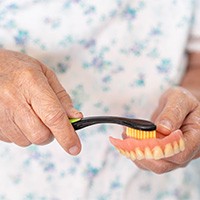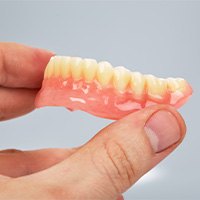Full & Partial Dentures in Carlisle
 A denture is designed to replace a significant number of lost teeth in a conveniently removable fashion, with both full and partial designs available depending on the patient’s unique needs. Your appearance is left relatively unchanged by dentures allowing you to maintain plenty of oral function and self-confidence as you go about your daily routine. If you’d like to schedule a consultation, please contact Flenniken Family Dentistry here in Carlisle, PA today. Dr. Flenniken, Dr. Suzan Rismani-Flenniken, Dr. Stephen Capiotis, Dr. Joseph Olivetti, Dr. Marvin Berger, and the rest of our accomplished staff look forward to meeting you.
A denture is designed to replace a significant number of lost teeth in a conveniently removable fashion, with both full and partial designs available depending on the patient’s unique needs. Your appearance is left relatively unchanged by dentures allowing you to maintain plenty of oral function and self-confidence as you go about your daily routine. If you’d like to schedule a consultation, please contact Flenniken Family Dentistry here in Carlisle, PA today. Dr. Flenniken, Dr. Suzan Rismani-Flenniken, Dr. Stephen Capiotis, Dr. Joseph Olivetti, Dr. Marvin Berger, and the rest of our accomplished staff look forward to meeting you.
Full Dentures
Like the name suggests, full dentures are used to replace an entire arch of missing teeth in a sturdy and lifelike fashion. They stay in place within the patient’s smile through natural suction or a little dental adhesive for additional security. Our team in the Carlisle area makes any and all adjustments necessary to ensure the most precise and satisfying fit possible.
Partial Dentures
A partial denture is designed to replace a unique arrangement of missing teeth on either the lower or upper jaw. This allows patients to maintain what’s left of their natural smiles while successfully filling in the gaps and preventing remaining teeth from shifting. Like full dentures, partial dentures are removable, and stay in place with the help of expertly placed clips and brackets.
Denture Maintenance
Patients with dentures should make sure to treat them like they’re actual teeth cleaning them regularly and removing plaque to prevent staining. If possible, use a brush with soft bristles that’s been designed for denture use and a denture cleaner. It’s also crucial for your denture to stay moist at all times, so place it in a cup of denture soaking solution or normal water while you’re not wearing it.
The Benefits of Dentures

Whether you’re missing one, some, or all of your pearly whites, dentures can be the reliable, cost-effective, and natural-looking solution you need to regain your beautiful smile. Not only can they help you have a full grin again, but they can also improve other aspects of your overall well-being. Here are some of the benefits of dentures that you can expect to appreciate after your treatment.
Psychological Benefits

Having missing teeth not only hinders some of your daily oral habits, like eating and talking, but also your self-esteem. Not being able to show off a full set of teeth can often make those suffering from tooth loss feel self-conscious about their appearance, which can then lead to feelings of sorrow and depression. By wearing custom-made and lifelike dentures, you’ll be able to regain your bite as well as significantly reduce any anxieties about your appearance, chewing ability, speech, and more.
Clearer Enunciation

Whenever a person loses even one of their teeth, their ability to speak can change drastically. This is because we typically press our lips and tongues against our teeth in order to enunciate certain words and sounds. With significant tooth loss, it can become incredibly difficult to converse comfortably or even speak clearly. Dentures can help rebuild your smile as well as improve your speech articulation in the long run.
Improves Nutrition

Did you know that some healthy foods can also be tougher in texture? Being unable to chew your meals properly can potentially lead to complications like indigestion and malnutrition, and many of those suffering from tooth loss simply can’t enjoy many other foods that require excessive chewing. Fortunately, dentures can help rebuild your bite while also allowing you to expand your dietary choices to include more vitamin-rich options, like lean meats, fruits, veggies, and dairy products, that can promote stronger bones and healthier gums.
Preserves Oral Health

Some patients might still have some of their natural teeth remaining after tooth loss. However, due to a lack of stimulation in the jawbone, the tissue can begin to deteriorate, causing the facial structure to shrink. Additionally, other remaining teeth may begin to shift out of place to fill in the space, which can lead to further tooth loss. Since dentures can fit perfectly in your smile, they can even serve as placeholders for any teeth you still have. They can also reduce wear and tear on your other teeth by evenly distributing the pressures from chewing.
Expands Opportunities

First impressions are everything, and one of the things people will initially notice about you is your smile. This makes having a full grin incredibly important, whether you’re preparing for a date or a job interview. With dentures, you’ll not only boost your confidence with a full smile, but you can also expand your opportunities in both your professional and social settings.
Who’s a Good Candidate for Dentures?

Whether you’re missing some or all of your teeth, anyone who has suffered from tooth loss can potentially benefit from dentures. They’re a versatile solution that can refurbish your smile so that you can enjoy eating, speaking, and smiling more easily. However, before you can be fitted for your restoration, you must schedule a consultation with one of our dentists at Flenniken Family Dentistry. They’ll ensure there are no other issues that could interfere with your artificial teeth, like cavities or gum disease.
Continue reading below to learn more about the characteristics of an ideal candidate for dentures, and feel free to contact us for additional information.
Effects of Missing Teeth

According to the American College of Prosthodontists, gum disease is the number one leading cause of tooth loss. It’s estimated that about 47% of American adults who are 30 years or older have it, making it an incredibly common but dangerous concern. You might also lose adult teeth if you have tooth decay that spreads to your jawbone and weakens it or physical trauma that knocks one out.
Whatever the reason, tooth loss can detract from your daily quality of life. You might have challenges enunciating certain words or become malnourished if you’re unable to eat a wholesome diet. On top of that, your jawbone begins to weaken without anything there to stimulate new bone growth. Eventually, this can cause the shape of your face to change. You can develop sunken cheeks that result in additional facial wrinkles that make you look older. That’s why it’s important to replace your missing teeth as soon as you’re able.
What Qualifies You for Dentures?

Dentures may not be right for everyone in every circumstance, but they are an ideal solution if you have:
- Significant tooth loss.
- Sensitive teeth.
- Severe tooth decay.
- Healthy gum tissue.
- Sufficient jawbone strength.
There are three types of dentures: partial, full, and implant dentures. Because everyone’s situation is unique, we cannot tell you ahead of time which is the best option for you. Once you have a consultation with one of our team members, we’ll make a recommendation based on your current dental condition.
Alternative Tooth-Replacement Options

If we determine that you’re not a good candidate for dentures, don’t lose hope! We’re happy to discuss other replacement options with you, including:
- Dental bridges. These prosthetics are perfect for those who are missing one or a few teeth consecutively. They require healthy teeth on either side of the gap in your grin to serve as an anchor for your restoration.
- Dental implants. This is the only method that involves surgically placing a titanium rod into your jawbone to serve as a support. Although these artificial teeth may be more costly, they’re a great long-term replacement.
Understanding the Cost of Dentures

Just like many other types of dental treatments, dentures can have varying costs depending on each person’s situation. At Flenniken Family Dentistry, we understand the importance of being able to afford the procedures you need to get back on track with great dental health. To determine the overall price, you’ll need to schedule a consultation with our team to discuss the factors that can affect the cost of dentures in Carlisle. Read on or reach out to us if you want to learn more today!
Factors That Affect the Cost of Dentures

Several key factors can influence the overall cost of your dentures, including:
- The kind of materials that are used, such as porcelain or acrylic.
- The extent of your tooth loss (needing to replace a few or an entire row of missing teeth).
- The need for preliminary treatments, like gum disease therapy or tooth extractions.
It’s important to remember that cheaper materials don’t typically provide better quality. Dentures constructed out of lower-grade components may be more convenient upfront, but they’ll likely require replacements more frequently, increasing the overall cost.
Are Implant Dentures More Expensive?

Since they involve oral surgery and the placement of several metal posts, implant dentures are usually more expensive than traditional ones. However, they do provide patients with various worthwhile advantages. Not only are directly anchored to the jawbone, offering more lifelike stability, but they can also last you for 15 years or more with proper care. This means you’ll be able to enjoy all of your favorite foods for a lifetime without worrying about them falling out.
Does Dental Insurance Cover Dentures?

Since they’re considered an “essential” restorative procedure, many dental insurance providers offer coverage for around 50% of the cost of dentures. These plans, however, vary from person to person, so it’s best to speak with your insurance company to understand the details of your policy. You can also speak with our team about your coverage, and we’ll be more than happy to help you make the most of your benefits!
Other Options for Making Dentures Affordable

If you don’t have dental insurance, then you can still consult us about alternative payment options. We are partnered with a trusty third-party financier called CareCredit that can make your treatments stress-free. With their help, your overall payment can be split into monthly installments that hold little to no interest! Feel free to speak directly with our team if you’re interested, and we will gladly help you discover an option that can help make your dentures more affordable in the long run.
Dentures Aftercare

You’ll naturally want to do everything you can to get the most out of your new dentures. As such, it’s important to give them proper maintenance to help them last as long as possible. Additionally, you should also be taking steps to make sure that your dentures aren’t contributing to any oral health issues. Below you will find a number of useful tips from our team for taking care of your dentures on a daily basis.
Remove After Eating

Dentures can’t get cavities, but food debris and plaque can still accumulate on them and cause problems for your mouth. To prevent this, you should take out your dentures and thoroughly rinse them off whenever you’re done eating. Hot water might change the way your dentures fit, so make a point of using cool water instead.
Clean Your Restoration

To get rid of the harmful bacteria that might have built up on your dentures, you should give your prosthesis a thorough cleaning at least once a day. To do so, carefully take your dentures out of your mouth. Then brush them gently using a soft-bristled toothbrush and some hand soap or dish soap. If time allows, you can also immerse your dentures in a cleansing solution and let them soak for a while. Before wearing your dentures again, rinse them thoroughly to get rid of lingering cleaning products.
Keep Your Dentures Safe

Dentures are not indestructible; if you’re not careful with them, they could be broken by accident. You should therefore take whatever steps are necessary to keep your prosthesis safe. For example, you should keep a towel under your dentures while you’re cleaning them. This will give them a safe place to land if they’re dropped. Additionally, if you have kids or pets, you should always make sure that your dentures are kept out of their reach.
Remove Dentures When You Sleep

Dentures are not meant to be worn 24/7. Doing so is bad for your gums, and it can lead to higher levels of plaque in your mouth. Even worse, studies show that people who wear dentures at night are more likely to catch pneumonia. In short, you should get in the habit of taking your dentures out of your mouth before bedtime.
Remember, when you’re not wearing your dentures, they should be kept in a soaking solution. You don’t want them to dry out and lose their shape.
Notice Changes

Potential problems with your dentures should be addressed as soon as possible. As such, if you notice any changes in your prosthesis or your mouth, we recommend that you let us know immediately so that we can identify the root of the problem and help you find a solution. Examples of changes you should watch for include:
- Mouth sores.
- Irritated gums.
- Oral infection.
- Damaged artificial teeth.
- Dentures that don’t seem to fit properly anymore.
Denture FAQs

Dentures in Carlisle have been used for generations to restore beautiful, functional smiles. Although you’d like to put the struggles of tooth loss behind you, it’s normal to have a few concerns before you are ready to agree to them. We will explain everything during your denture consultation. While you wait for your appointment, here are the answers to a few frequently asked questions.
Should I have all my teeth pulled for dentures?
The answer depends on your specific situation. Your denture dentist in Carlisle strives to preserve every natural tooth; however, some teeth can be beyond repair. As a result, it’s better to have them removed. In some cases, it can also be more cost-effective to extract damaged teeth and replace them with dentures than it would be to fix them. Your dentist will examine your mouth and review all your options before recommending any extractions. There isn’t a limit to the number of teeth that can be removed in a single appointment, but you’ll need to wait for your gums to heal before getting your dentures.
Can I sleep with my dentures in my mouth?
You’ll be advised to wear your dentures for a full 24 hours after getting them, but then you’ll need to get in the habit of removing them nightly. Although no one wants to get caught without their teeth, your dentures will restrict blood circulation to your gums. Sores and irritation can occur if the soft tissues aren’t given time to get the nutrients needed to stay healthy. Not to mention, your mouth is a dark, moist environment. It’s the perfect place for harmful oral bacteria to thrive. Removing your denture nightly allows you to clean your mouth and new set of teeth to reduce bad bacteria. You’ll keep your mouth clean and your breath fresh while also promoting the lifespan of the prosthetic. After taking your dentures out for the night, clean them well before placing them in an overnight soaking solution. It will kill anything left behind by your toothbrush and keep your dentures moist to prevent warping when they aren’t in your mouth.
Does an upper denture always cover the palate?
Dentures are available in many styles, so an upper denture doesn’t always have to cover the palate. If you’re worried about it diminishing the taste of food, you can choose a style that has a horseshoe shape. It will look like one used for the lower arch or an implant denture to leave the palate uncovered.
Do I use regular toothpaste to clean my denture?
Your dentures will act as your real teeth, but they can’t be cleaned the same way. Hard-bristled toothbrushes and regular toothpaste can leave small scratches on your dentures. This can tarnish their appearance and decrease their lifespan. Food particles and plaque can get trapped in the small crevices, leading to unpleasant odors. It’s best to use a soft-bristled toothbrush and mild hand soap or dishwashing liquid to clean them. You can also purchase OTC cleaning solutions designed for denture wearers.












